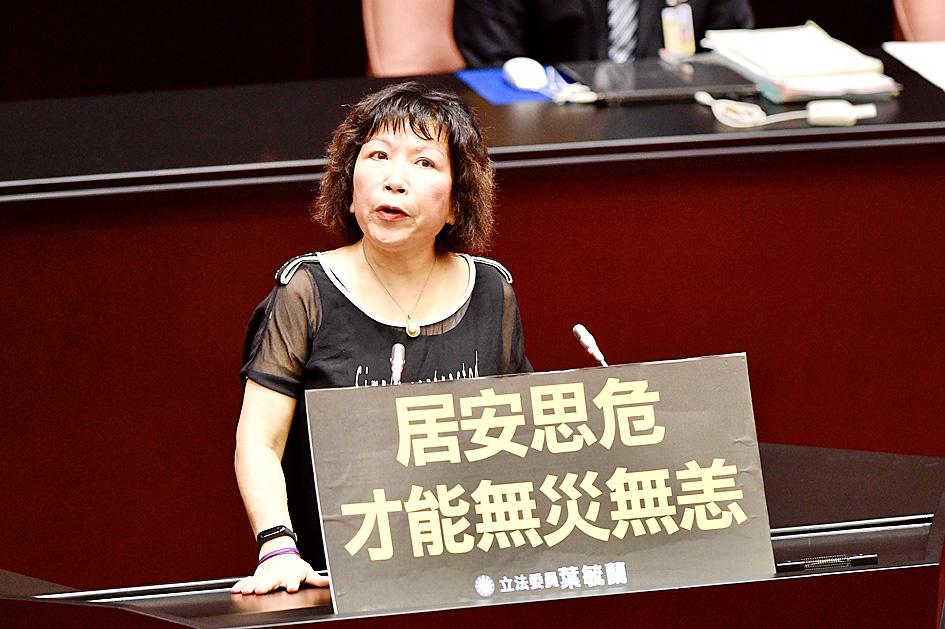Chinese Nationalist Party (KMT) Legislator Wan Mei-ling (萬美玲) yesterday said that she would sponsor a bill to amend the Criminal Code to mandate that people with mental disorders who have committed a felony undergo compulsory treatment for five to 10 years.
Wan said that she drafted the bill after the Chiayi District Court on Thursday found a 55-year-old man surnamed Cheng (鄭) not guilty of the murder of police officer Lee Cheng-han (李承翰), to “prevent mental illnesses from becoming pretexts for committing felonies.”
The ruling did not meet the public’s expectations, which proves that the Criminal Code needs to be amended, she said.

Photo: George Tsorng, Taipei Times
Five years of treatment might suffice for offenders with mild mental illnesses, but would not be enough for those who commit a serious crime, she added.
Under her proposed amendment to Article 87 of the Criminal Code, if a person with psychosis commits a crime warranting a prison term of at least 10 years or a life sentence, they should be placed in custody for compulsory treatment for at least 10 years.
“This would deter people from faking a mental illness in the hopes of receiving a not guilty verdict or lighter penalties,” Wan said.
On Friday, KMT Legislator Yeh Yu-lan (葉毓蘭) sponsored a draft amendment to the Criminal Code seeking to increase penalties for people who commit homicide, bodily harm or grievous bodily harm against law enforcement or medical personnel.
Penalties for obstructing official duties stipulated in the Criminal Code and the Medical Care Act (醫療法) are too lenient and ineffective at protecting police and medical personnel from violence, she said.
Article 271 of the Criminal Code stipulates that people who have committed homicide should receive a prison term of at least 10 years, life imprisonment or the death penalty, while those guilty of attempted murder face a prison term of up to two years.
Article 277 of the Criminal Code stipulates that people who inflict bodily harm on others face a fine of up to NT$500,000, detention or a prison term of up to five years, while those who cause serious bodily harm face a prison term of three to 10 years and those who cause bodily harm that results in death face a prison term of at least seven years.
Article 278 of the Criminal Code stipulates that people who inflict grievous bodily harm on others face a prison term of between five and 12 years, while those who inflict grievous bodily harm that results in death face a prison term of at least 10 years or life imprisonment.
Under Yeh’s proposal, the penalties would be increased by 1.5 times if the victim of the crime is a civil servant or medical personnel who were discharging their duties.
Asked for comment on the ruling, Premier Su Tseng-chang (蘇貞昌) yesterday said that the judge must have had a reason for finding Cheng not guilty, adding that he believed that society would respect the verdict.
However, it is worth considering whether one medical institution is enough when verifying a suspect’s mental health, and whether a suspect should face liability if they have a mental illness, but stopped taking medication either deliberately or out of negligence, he said.
If a suspect is acquitted due to a mental disorder, they should undergo mandatory treatment to close any possible breaches in public safety and allay people’s concern, he added.
Additional reporting by Sean Lin

CAUTION: Based on intelligence from the nation’s security agencies, MOFA has cautioned Taiwanese travelers about heightened safety risks in China-friendly countries The Ministry of Foreign Affairs (MOFA) yesterday urged Taiwanese to be aware of their safety when traveling abroad, especially in countries that are friendly to China. China in June last year issued 22 guidelines that allow its courts to try in absentia and sentence to death so-called “diehard” Taiwanese independence activists, even though Chinese courts have no jurisdiction in Taiwan. Late last month, a senior Chinese official gave closed-door instructions to state security units to implement the guidelines in countries friendly to China, a government memo and a senior Taiwan security official said, based on information gathered by Taiwan’s intelligence agency. The

Taiwan Semiconductor Manufacturing Co (TSMC), the world’s largest contract chipmaker, said yesterday that it is looking to hire 8,000 people this year, at a time when the tech giant is expanding production capacity to maintain its lead over competitors. To attract talent, TSMC would launch a large-scale recruitment campaign on campuses across Taiwan, where a newly recruited engineer with a master’s degree could expect to receive an average salary of NT$2.2 million (US$60,912), which is much higher than the 2023 national average of NT$709,000 for those in the same category, according to government statistics. TSMC, which accounted for more than 60 percent

The National Immigration Agency (NIA) said yesterday that it will revoke the dependent-based residence permit of a Chinese social media influencer who reportedly “openly advocated for [China’s] unification through military force” with Taiwan. The Chinese national, identified by her surname Liu (劉), will have her residence permit revoked in accordance with Article 14 of the “Measures for the permission of family- based residence, long-term residence and settlement of people from the Mainland Area in the Taiwan Area,” the NIA said in a news release. The agency explained it received reports that Liu made “unifying Taiwan through military force” statements on her online

Tung Tzu-hsien (童子賢), a Taiwanese businessman and deputy convener of the nation’s National Climate Change Committee, said yesterday that “electrical power is national power” and nuclear energy is “very important to Taiwan.” Tung made the remarks, suggesting that his views do not align with the country’s current official policy of phasing out nuclear energy, at a forum organized by the Taiwan People’s Party titled “Challenges and Prospects of Taiwan’s AI Industry and Energy Policy.” “Taiwan is currently pursuing industries with high added- value and is developing vigorously, and this all requires electricity,” said the chairman